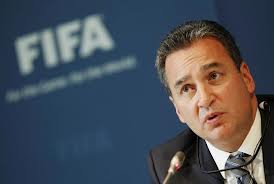By Paul Nicholson
March 12 – Michael Garcia, the American lawyer charged with investigating corruption in football, has given a very clear message to administrators and officials throughout the game: if you have information and “you want to talk, come and talk to me now. I am under orders from no-one.
It is a mission that has a wide-ranging brief, and Garcia explains his terms of reference, timescales, and the resources at his disposal.
It is the terms of reference, he stresses, that are important to understand. “I must consider the conduct of the people administering football,” said Garcia. “The mission is simple – to investigate possible violations of ethics.”
In practical terms this means Garcia will not be stripping any of the World Cup hosts of their right to host – most notably Qatar who have come under continued and, usually, whispered bombardment. That is not his investigation. He will be reporting on any individuals who have crossed the ethics line in the process though.
Garcia has used external investigators, lawyers and independent experts in different legal jurisdictions to conduct his task. He has also used the services of FIFA itself, though generally only to convey messages, provide official files and help with communication.
And, he is at pains to point out to the sceptics, he has worked independently and has had very little interaction with FIFA president Sepp Blatter. “He is the president of FIFA, he does what he has to do. I met him maybe … once during the first three months of my mission,” said Garcia. Instead Garcia’s contact is with FIFA’s secretariat “and there has never been any problem with them – they have even been proactive”.
Asked about the awarding of the 2018 and 2022 World Cups, to Russia and Qatar respectively, Garcia is considerably more circumspect about whether they are covered by his investigation. “This is a lengthy process…I really have no pre-conceived ideas. When you talk to people about the World Cup [in 2022] they already have strong opinions…or large interests at stake. Not me. I have no opinion, like when 2022 should take place, for example. But…I will consider all the information with the same impartiality.”
Significantly, he says, delivering his report to FIFA is unlikely to happen by the time the FIFA Congress takes place in May, an interesting observation given that the Mauritius summit is when Blatter’s reform programme is to be put to the vote. “May is too soon,” said Garcia. “I hope that significant progress will have been made by then – there will have been a crystallisation of issues on which we need to focus.”
But realistically, how independent can an investigator paid by the body it is investigating actually be, Garcia was asked? His response was that it was not an issue. “This is not such an unusual relationship. In the US when a company has problems it will use an outside auditor, usually in the context of an agreement with government. The auditor will be completely independent, and usually will submit its report to the government – but it will be paid by the company!”
Garcia replied “absolutely” when asked if he would put all his findings on the table. What if such findings suggested World Cup hosts be stripped of staging the event? This, he said, was unlikely.
“Our jurisdiction is limited to individuals. The only thing we can do is say, ‘You, head of football have violated this clause of the code of ethics, and you, in charge of football, will be punished with the penalty.’ But it is only people. This is what we can do, okay? These decisions, on the venue for the World Cup, you know, it is outside the jurisdiction of the Ethics Commission. It is a completely separate process.”
The first fruits of Garcia’s investigations will be his report on the infamous ISL corruption case, which exposed a number of high-profile FIFA officials, and the dismissal of the criminal investigation into FIFA itself. Garcia says that there will be a preliminary statement by the time of the FIFA Executive Committee meetings March 20/21.
“This is a topic that came across my desk the day I took office,” he said. “I must consider the dismissal of the criminal investigation into FIFA and make a report. … I must follow the normal procedure, and present it [Garcia’s findings] to Judge Eckert, who is the chairman of the adjudicatory chamber of the Ethics Committee. He will read my report and take appropriate decisions. I will also follow the procedure by informing the Executive Committee of course what I do.”
“A timetable has been established. There is an Executive Committee meeting on 20 and 21 March. My goal is to have at least a preliminary statement by then.”
There is a sense that the ISL case is almost a diversion for Garcia, an old wound in FIFA from a previous time that will be almost impossible to heal sufficiently. There are clearly bigger fish to investigate. “There are many other cases in the study,” he said.
The World Cup vote allegations would appear to be top of this list — even though the ultimate penalty of stripping Russia and Qatar as hosts seems to be a long way off.
For the full interview with Michael Garcia, by Philippe Auclair and Eric Champel, read today’s edition of France Football.
Contact the writer of this story at moc.l1751413404labto1751413404ofdlr1751413404owedi1751413404sni@n1751413404osloh1751413404cin.l1751413404uap1751413404

